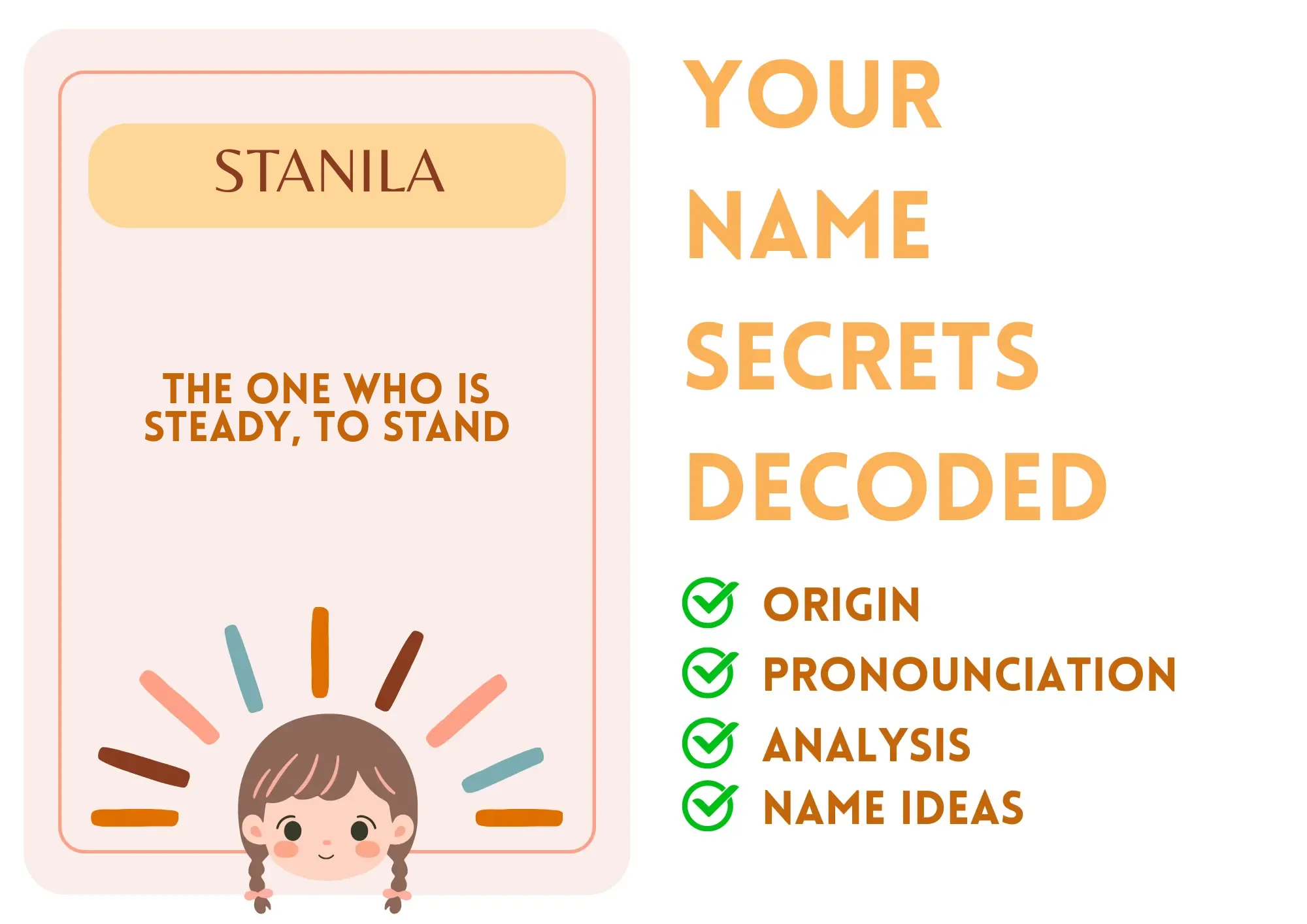
Stanila
Stanila is a fascinating name that carries Slavic roots and suggests stability and strength. It is often associated with the meaning 'the one who is steady' or 'to stand.' Commonly used in Eastern European countries, it is primarily a feminine name yet may also have unisex appeal. The name has a significant cultural backdrop, representing resilience and steadfastness in character.
Stanila resonates with positivity, embodying the qualities of dependability and fortitude. It is relatively easy to pronounce and write, making it approachable and memorable. Common nicknames such as Stani or Lila enhance its charm.
In terms of cultural influence, Stanila may not be prevalent in mainstream global media but can be found within literary contexts or folklore, often symbolizing a strong-willed character.
Basic Information
Gender: Girl
Sounds Like: stah-NEE-lah
Pronunciation Explanation: The first syllable is pronounced 'stah', while the second syllable 'NEE' is emphasized, and the final 'lah' is soft.
Summary and Meaning
Meaning: the one who is steady, to stand
Origin: The name Stanila originates from Slavic languages, reflecting characteristics valued in Slavic culture.
Usage: Stanila is traditionally recognized as a feminine name but can also be used as a unisex name depending on the context.
Name Number (Chaldean)
Name Number (Pythagorean)
Popularity (Global Rank)
Overall: 97899
Girls: 64276
Most Popular in
Religious and Cultural Significance
Religion: Christian
Background: While the name does not have a specific religious connotation, it is commonly used among Christian communities in Eastern Europe.
Cultural Significance: Stanila is valued in Slavic cultures for its associations with strength and resilience, often chosen for its significant meaning and cultural roots.
Historical Significance: Historically, names related to standing firm or stability have been emphasized within Slavic cultures to denote honor and strength, making Stanila a name of importance.
Popular Culture
Literature and Mythology: Stanila may not be a prominent name in global literature but resonates within Slavic folklore, often representing strong female archetypes.
Movies and Television: The name Stanila has appeared in some Eastern European films, typically portraying characters with a robust and determined nature.
Feelings and Perceptions
Perception: Stanila is generally perceived positively. It is viewed as a strong and unique name, suggesting stability and resilience. It offers a sense of cultural richness, appreciated among those familiar with Slavic heritage.
Positive Feelings: Strong, unique, resilient, distinguished, cultural.
Negative Feelings: Some may find it unfamiliar or challenging to pronounce initially.
Practical Considerations
Ease of Writing and Calling: Stanila is easy to write and pronounce, consisting of seven letters and four syllables. This makes it relatively straightforward to remember and call.
Common Typos and Misspellings: Stanila,Stenila,Stenilla,Stanela
Common Nicknames: Stani,Lila,Tani
Stanila Popularity
Stanila Usage and Popularity By Country
| Country | Rank (Overall) |
|---|---|
| Romania | 1417 |
| Moldova | 2361 |
| Bulgaria | 5093 |
| Germany | 23723 |
| Japan | 26195 |
| Belgium | 30171 |
| Italy | 32579 |
| France | 48370 |
| Spain | 63520 |
| United Kingdom | 118019 |
Stanila Usage and Popularity By City
| City | Rank (Overall) |
|---|---|
| Bucharest | 2107 |
| London | 46025 |
Compatibility Analysis
Famous Persons Named Stanila
No results found for Stanila.
Related Names
Similar Sounding Names:
Stella,Selina,Svetlana,Savina
Similar Meaning and Related Names:
Kamila ♀️
Islam, Christianity, Polish
Mira ♀️
Hindu, Jewish